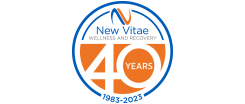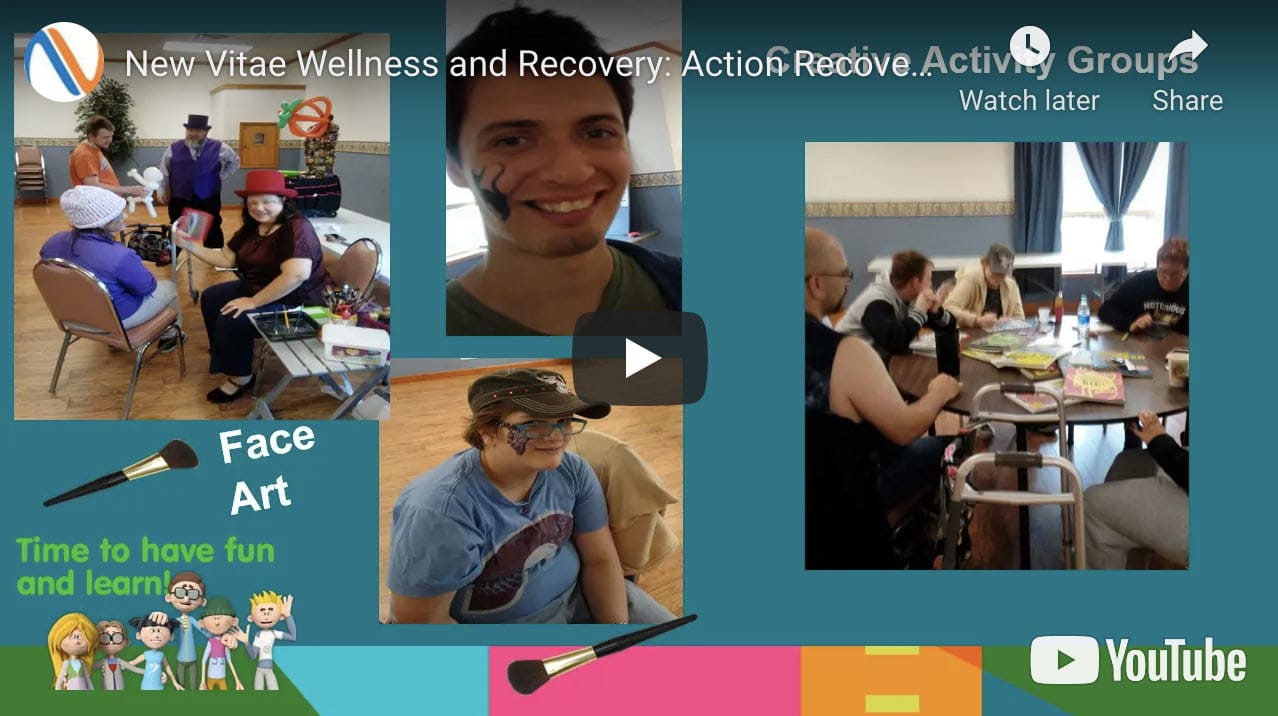As part of the celebration to commemorate March as Brain Injury Awareness Month, New Vitae Wellness and Recovery’s Action Recovery Brain Injury Program hosted its first virtual open house on March 31st, 2021. Following a brief introduction by Kathi Eichman, MS, CHC, Mary Cowgill, EdD, MA, CBIST, provided an in-depth review of the physical, emotional, and other changes that can occur following a traumatic brain injury. Cowgill also reviewed the New Vitae Action Recovery program and shared direct feedback from residents regarding their specialized supports.
The presentation began with an overview of two types of traumatic brain injury (TBI): traumatic impact injuries and traumatic inertial injuries.
- Impact injuries occur when a person’s head is struck by or against an object, resulting in either an open injury (when the person’s skull is breached) or a closed injury (which results in no penetration of the skull). Impact injuries can occur as the result of an assault, a fall, a car accident, a sports-related accident, gunshot, or other types of trauma.
- Inertial injuries occur when the brain shifts and hits the skull, resulting in an injury to the brain in a single site or diffuse areas. Inertial injuries are frequently the result of falls, sports-related injuries, or motor vehicle accidents – any force that causes the brain to move and hit against the inside of the skull. The effects of traumatic brain injuries are diverse and can include impairments related to thinking, memory, movement, vision, sleeping, and emotional functioning.
In spite of the significant aftermath for individuals and families following a brain injury, Cowgill reported that the rates of traumatic brain injury have increased gradually each year, with 13.5 million United States citizens, or 4.5% of the population, living with a disability that resulted from a traumatic brain injury. These injuries are found to be a contributing factor in approximately one-third of all injury-related deaths in America. Brain Injuries are significant, commonplace, complex, and can result in significant impairment post-injury, requiring specialized services to ensure individualized care.
Cowgill provided additional details regarding New Vitae Wellness and Recovery’s Action Recovery Brain Injury Program. With a variety of team members, including care coordination staff, certified brain injury specialists, therapists, a licensed psychologist, licensed behavioral health therapists and a staff psychiatrist, the program is able to provide a variety of services through well-trained and caring staff, ensuring positive outcomes and promoting goal achievement for residents. Action Recovery continues to be CARF accredited, providing evidence of the high levels of service and quality associated with programming. New Vitae offers both Neurocognitive Structured Day services as well as Residential Habilitation supports, ensuring a range of options and opportunities for treatment:
- New Vitae’s Neurocognitive Structured Day services provide an outlet for social interaction while participants learn or re-learn a variety of skills post-injury, all in a fun and supportive environment. Individuals work within small groups, focusing on a variety of topics that can include: cognitive skill training, vocational skills development, daily living skills, and even technology training. Group participants enjoy a variety of creative activities, designed to assist with developing motor function, attention and concentration, or other cognitive skills that have real-world meaning and applications. Participants and group leaders assist each other to learn, share and grow talents, and can improve skills needed for more independent living.
- The Action Recovery Residential Habilitation services provide residential supervision that can be customized for intensive or more intermittent support. Offering individualized interventions to promote improved self-care and life skills, the residential service offers routine social, volunteer, and vocational opportunities to promote growth and skill development. Money management, cooking, household management, and personal care skills can all be addressed within a safe and comfortable home-like environment. Leisure activities and other opportunities are frequently scheduled in order to promote social skill development and interpersonal growth.
Cowgill concluded the informational session with heartfelt and personalized messages of growth from Action Recovery residents. After briefly discussing a past traumatic brain injury, three residents shared meaningful stories of hope as a result of the interventions and support they shared at New Vitae.
We invite you to learn more by reviewing the Open House video. Know someone who could benefit from our brain injury services? Contact us today for additional information!

